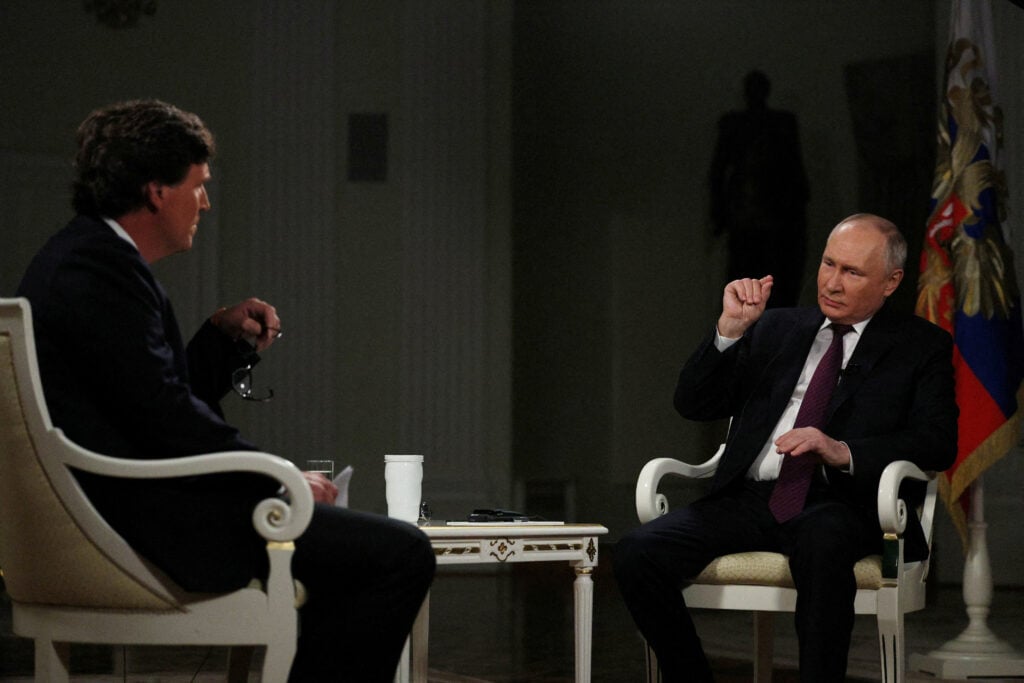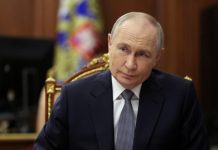By Peter Dickinson, for UkraineAlert
US media personality Tucker Carlson’s hotly anticipated interview with Vladimir Putin was billed as a unique opportunity to challenge Western perceptions of the war in Ukraine and hear Russia’s side of the story. Instead, Putin hijacked the spectacle to underline his status as the world’s most dangerous amateur historian.
The interview began in predictable fashion with Carlson inviting Putin to blame NATO and the US for the ongoing invasion. However, it was soon apparent that the Russian leader had something very different in mind.
Sidestepping Carlson’s opening question, Putin launched into a rambling half-hour lecture covering more than a thousand years of Russian and Ukrainian history that placed the roots of today’s war firmly in the distant past. His core message was chillingly simple: Ukraine has no right to exist and he is fully justified in waging a war of aggression to reclaim historically Russian lands.
Carlson admitted to being initially shocked and annoyed by this monologue, but eventually concluded that Putin’s insistence on articulating his historic claims to Ukraine was actually “a sincere expression of what he thinks.” This seems a fair assessment. Putin’s obsession with history is well known, as is his conviction that Ukrainians are in fact Russians. Indeed, anyone who has listened to Putin’s many public statements on the topic of Ukraine or read his 2021 essay on the “historical unity” of Russians and Ukrainians will have been more than familiar with the content of his latest lecture.
While Putin has often been accused of weaponizing history, it was nonetheless revealing that he should choose to prioritize his historical grievances in such a setting. After all, this was the Russian president’s first major interaction with the Western press since the start of the Ukraine invasion almost two years ago. Tucker Carlson had been handpicked for the occasion, having won the trust of Moscow officials via years of pro-Kremlin messaging in the US media.
The interview was viewed by many within the Putin regime as a rare chance for Russia to make its case on its own terms to a truly global audience. Unfortunately for the Kremlin, things did not go according to plan. Rather than coming away convinced by the rationality of Putin’s arguments, many viewers were left bewildered by his arcane references to medieval princes and seventeenth century diplomatic correspondence.
Needless to say, much of Putin’s lecture was complete nonsense that echoed longstanding Russian imperial myths while conveniently overlooking Ukraine’s centuries of documented history. In his traditional manner, Putin ridiculed Ukraine as an illegitimate and artificial state. He dismissed the entire notion of a separate Ukrainian nation, calling it an anti-Russian conspiracy involving everyone from the Poles and the Pope to the Austrian General Staff.
These claims owe more to Kremlin propaganda than any actual academic rigor. In reality, the term “Ukraine” first appeared in the twelfth century, while Ukraine’s statehood struggle can be traced back more than three hundred years. As long ago as 1731, French thinker Voltaire was moved to write, “Ukraine has always aspired to be free.”
Putin’s insistence that southern and eastern Ukraine are historically Russian is similarly unsupported by the available evidence. The 1897 census conducted by the Czarist authorities, which provides the most reliable guide to the demographic makeup of the Russian Empire, identified Ukrainian-speaking majorities throughout much of today’s southern and eastern Ukraine, as well as in a number of regions that are now part of Russia.
Likewise, Putin’s assertion that Lenin and Stalin created modern Ukraine ignores the inconvenient fact that the short-lived Ukrainian People’s Republic had already existed for a number of years before the early Bolsheviks were finally able to extinguish this fledgling Ukrainian state and impose Soviet rule.
Many more of Putin’s statements have since been comprehensively debunked by everyone from the BBC and TIME magazine to the diplomats of the Polish Foreign Ministry, who were understandably outraged by the Russian leader’s attempt to justify Adolf Hitler’s 1939 invasion of Poland. As Carlson himself showed little interest in challenging Putin, these fact-checking efforts are particularly important.
At the same time, the real takeaway from the interview was Putin’s apparently genuine belief that his antiquated historical arguments could serve as plausible justification for a major war in twenty-first century Europe. This is perhaps the clearest indication yet of the dangerous delusions and imperial ambitions that led Putin to invade Ukraine.
Putin is no stranger to openly imperialistic rhetoric, of course. For years, he has subjected domestic audiences to long sermons detailing Russia’s historic grievances and the injustices of the post-Soviet settlement. Ukraine has always been the main focus of this revanchist zeal.
As his grip on power has tightened, Putin has grown increasingly fixated with the idea of reasserting Russian authority over Ukraine, and has come to view this as his historic mission. On the eve of the full-scale invasion two years ago, he described Ukraine as “an inalienable part of our own history, culture, and spiritual space.” In summer 2022, Putin directly compared the current war to the imperial conquests of eighteenth century Russian Czar Peter the Great and claimed to be “returning” historically Russian lands.
Unless Putin is defeated in Ukraine, it is fanciful to imagine that he will voluntarily abandon his increasingly aggressive brand of historical revisionism. On the contrary, it is far more likely that other countries will also fall victim to the Russian ruler’s expanding imperial ambitions. Naturally, Putin assured Tucker Carlson that he has no such intentions, but he has issued similar denials prior to each new stage of his escalating Ukraine invasion. At this point, the most logical conclusion is that he will not stop until he is stopped.
How far could Putin go? Throughout his reign, he has consistently lamented the fall of the USSR, which he has referred to as the demise of “historical Russia.” After the events of the past two years, it should be painfully apparent that anywhere Putin regards as “historical Russia” is potentially at risk.
In theory, at least, the same bogus historical arguments that have been used to justify the invasion of Ukraine could easily be applied to other parts of the former Soviet Union, or to the Russian Empire of the Czarist era. This would create an array of possible targets for Russian aggression including Finland, Poland, the Baltic states, Belarus, Moldova, Georgia, Armenia, Azerbaijan, Alaska, and the whole of Central Asia. A maximalist interpretation could even see all of Central Europe’s former Soviet satellite states besides Poland added to the list.
In today’s increasingly unstable geopolitical climate, talk of further Russian invasions can no longer be dismissed as alarmist. Mounting signs of Western weakness in Ukraine have visibly emboldened Putin, and may yet tempt him to test NATO’s resolve in a more direct manner. He has already succeeded in shifting the Russian economy onto a war footing, and is cranking up arms manufacturing at a rate that far outpaces the West. Even now, with the Russian invasion of Ukraine still very much undecided, it is all-too-easy to imagine waking up to social media posts labeling Kazakhstan an “artificial country” or proclaiming Estonia “historically Russian” as Putin’s tanks roll across the border.
As the tenth anniversary of Russia’s war in Ukraine draws close, Putin’s interview with Tucker Carlson should serve as a wake-up call for the collective West. A decade ago, Putin began his attack on Ukraine by occupying Crimea. At first, he acted with a degree of caution, officially denying any role in the military takeover of the Ukrainian peninsula and orchestrating a fig leaf referendum to disguise the crime. Ten years on, Putin now feels confident enough to sit down with one of the world’s most famous journalists and defend the invasion of a major European country by claiming it is rightfully his. Anyone who still believes he would not dare attack NATO is only fooling themselves.
Putin’s history obsession would be comical if the consequences were not so tragic. Using ancient dynasties and long forgotten treaties to justify the biggest European conflict since World War II is indeed farcical, and has duly inspired a flood of memes mocking the Kremlin dictator as a man completed detached from reality. But as we chuckle at Putin the ultimate history bore, he will continue distorting the past to shape the future. At present, there is a very real danger he will have the last laugh.
By Peter Dickinson, for UkraineAlert
Peter Dickinson is editor of the Atlantic Council’s UkraineAlert service.





